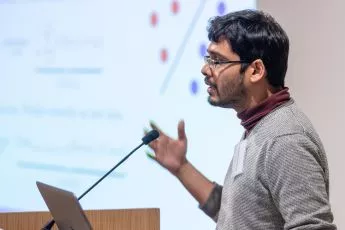What cutting-edge project are you working on right now?
My group develops mathematical theories to explain why modern machine learning is successful in practice. Since decades, there has been a general recommendation in machine learning to “use simple models that do not overfit on the training data”. Recent success of deep learning has questioned this belief since highly complex models (that overfit on the training data) perform very well in practice. In a recent research, we show that complex models may be better in a specific problem called causal regression. In an ongoing project, we are developing a new theory to answer a more difficult question: why is deep learning so good at learning patterns from unlabeled data?
What was the key experience that made you want to do research in data science and what fascinates you about working with MDSI?
I have been fascinated by the concept of artificial intelligence from an early age (thanks to Isaac Asimov). I did not know about data science or machine learning during my bachelor studies (in electrical engineering). I tried a bit of robotics and control, but soon realized that I am more interested in the mathematics behind these topics. Hence, I moved to computer science and then to statistics, and finally converged to the foundations of data science.
At MDSI, the diversity of the research domains of the MDSI fellows is astonishing. Also, MDSI provides a lot of opportunities to network and set up interdisciplinary collaborations (through seed grants, workshops etc.). More importantly, I get a sense of confidence that I do not need plan initiatives by myself, but can always reach out to MDSI' management office or other fellows for scientific, technical or administrative support.
What paradigm shift do you expect within the next ten years, triggered in particular by the Institute's interdisciplinary approach?
The notion of “data science” is rapidly transitioning from a research principle into a discipline and, in a decade, we may perceive “data science” as a discipline as broad as “science” or “engineering” (we may use STEMD instead of STEM). TUM MDSI and similar data science institutes at top universities, that currently act as interdisciplinary research institutes, play a significant role in this evolution of data science and could potentially become the foundation for future schools or departments of data science.
And what else? (Wishes, curious moments in research, outlooks, future projects etc.)
I look forward to new initiatives by the MDSI. In future, it would be interesting to see how MDSI could engage with the broader society, beyond academia and industry (for instance, through a platform for outreach programs about various aspects of data science: its role in scientific discoveries, policies about data, or AI ethics)
